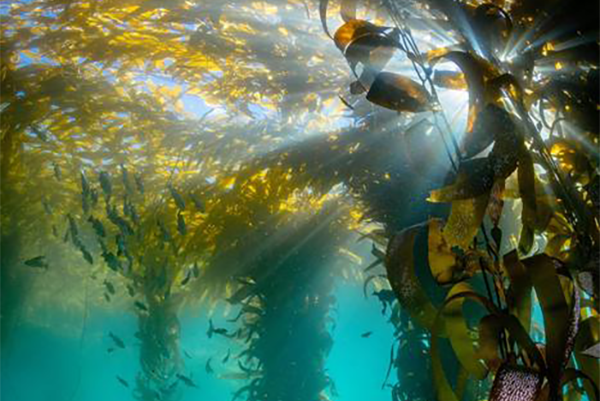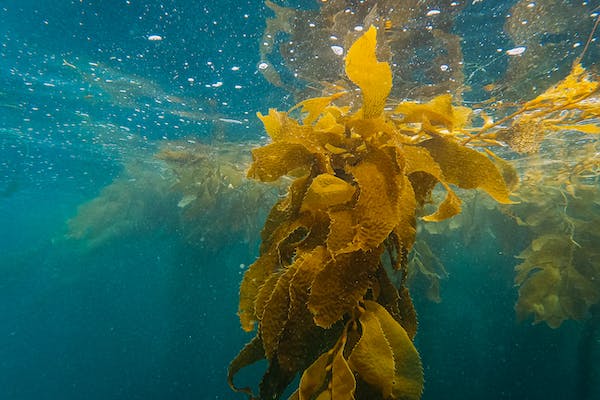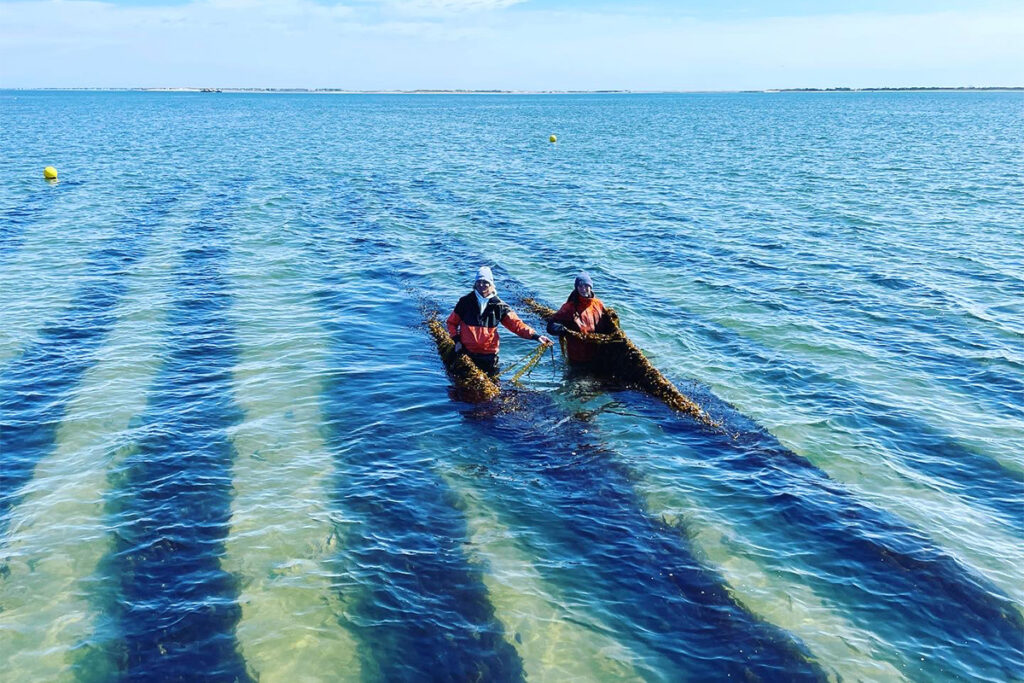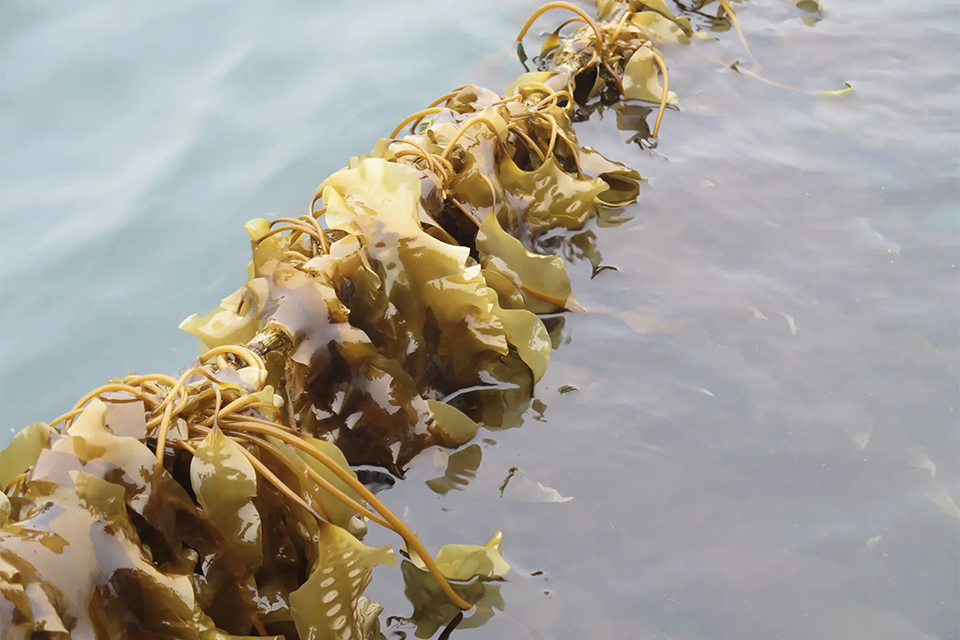Study provides first assessment of overall impact of kelp loss in Monterey Bay and offers insights into global kelp conservation

New research led by Monterey Bay Aquarium and the University of California, Santa Cruz, reveals that denser and more sheltered kelp forests can withstand serious stressors when faced with marine heatwaves caused by ocean warming.
The study, published in Proceedings of the Royal Society B, also offers a comprehensive assessment of how declines in kelp abundance affect marine algae, invertebrates and fish living in California’s Monterey Bay. The study comes after a multi-year marine heatwave – the product of a 2014 “blob” of warm water prolonged by a 2015-2016 El Niño event – bathed the North American Pacific coast with sweltering sea temperatures.
A decade ago, three major challenges – a massive marine heatwave, a sea star die-off and a sea urchin outbreak – caused a sharp drop in kelp levels along California’s central coast. Analyzing data spanning 14 years, researchers found that these events led to a 51 percent decline in kelp forest density on average in the years following the marine heatwave (2017–2020 compared to 2007–2013). By 2020, this decline had worsened to 72 percent. Despite this, some kelp forests managed to survive these extreme conditions.
“We found that larger stands of giant kelp prevented shifts in sea urchin foraging behavior, and these persistent forests were better at withstanding multiple stressors,” said Dr. Joshua Smith, the study’s lead author and Ocean Conservation Research Scientist at Monterey Bay Aquarium. “Something that surprised us was that persistent kelp forests were located in areas that are typically less productive. These persistent forests had a gradual reef slope and protection from wave exposure, which enabled them to become densely packed with kelp prior to the marine heatwave.”
Kelp has been declining worldwide for fifty years, dropping by about 1.8 percent annually. Since 2014, more than half of the ocean surface has faced extreme heat each year, putting cold-water species like kelp at risk due to ocean warming. As kelp forests and other marine ecosystems face growing threats from climate change, preserving these ecosystems and their predators, like sea otters, can help lessen the impacts of extreme events.
The study sought to understand the effects and resulting consequences of the marine heatwave and is part of Monterey Bay Aquarium’s larger effort to understand kelp recovery and restoration mechanisms. Findings indicate that certain habitat features are crucial for keeping kelp alive. For instance, another study from Monterey Bay Aquarium confirms that sea otters help by eating sea urchins, which can destroy kelp.
In places where kelp patches were less dense and more exposed, the sudden rise of sea urchins in 2014 led to many kelp forests becoming “barrens” – areas where sea urchins have eaten everything. The team looked at changes in species composition across the mosaic of barrens and persistent forests to untangle how kelp loss impacts the broader ecosystem.
Playing favorites: How selective breeding can grow the seaweed sector
“While some kelp forests have endured, the structure of the ecological communities in the barren areas have yet to return to their pre-2013 state,” Smith added. “Across the region, the number of species did not decline, but changes in their relative abundances led to an overall decline in species diversity, most notably for marine algae and kelp-associated invertebrates.”
With less kelp and other macroalgae around, the study noted a disproportionate increase in animals that eat plankton, such as barnacles, scallops, tube snails and planktivorous fishes.
“This study offers important insights to help inform strategies for protecting areas where kelp can persist on its own, and siting for kelp restoration efforts, here in California and around the world,” said Dr. Pete Raimondi, a marine ecologist at UC Santa Cruz who was not a co-author on the study.
Now that you've reached the end of the article ...
… please consider supporting GSA’s mission to advance responsible seafood practices through education, advocacy and third-party assurances. The Advocate aims to document the evolution of responsible seafood practices and share the expansive knowledge of our vast network of contributors.
By becoming a Global Seafood Alliance member, you’re ensuring that all of the pre-competitive work we do through member benefits, resources and events can continue. Individual membership costs just $50 a year.
Not a GSA member? Join us.
Author
-
Responsible Seafood Advocate
[103,114,111,46,100,111,111,102,97,101,115,108,97,98,111,108,103,64,114,111,116,105,100,101]
Tagged With
Related Posts

Intelligence
Can tapping into environmental DNA reveal kelp’s carbon sequestration potential?
A new global research project leverages environmental DNA to better measure and understand the carbon sequestration potential of kelp.

Intelligence
Meet the woman who’s pioneering commercial kelp farming in New York
Former professional basketball player Sue Wicks launches New York’s first commercial kelp farm, spearheading a growing industry for the state.

Intelligence
Maine seaweed farming company secures a kelp dryer and promptly decides to share it
Oceans Balance in Maine secured an industrial kelp dryer from South Africa that has the capacity to process other local seaweed farming producers’ plants.

Responsibility
Can kelp farming fix the planet? Experts weigh in on promises and pitfalls
How can kelp farming help solve global challenges? A panel of seaweed experts discussed promises, pitfalls and knowledge gaps.



